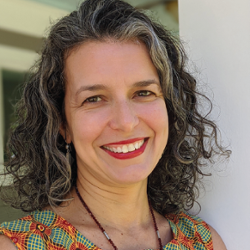Mariana P. CandidoWinship Distinguished Research Professor of History, 2023-2026 & Professor
Mariana P. Candido, Winship Distinguished Research Professor of History, 2023-2026 and Professor (Ph.D. African History, York University, Canada, 2006; M.A. African Studies, El Colegio de Mexico, Mexico, 2000; B.A. History, Universidade Federal do Rio de Janeiro, Brazil, 1997). Slavery and Abolition; Transatlantic Slave Trade; African Diaspora; Atlantic History; Slavery and the Law; Gender, Sexuality, and Women's History; Violence.
Mariana P. Candido is a specialist in the history of West Central Africa, including the Atlantic World and the African diaspora, in the era of the transatlantic slave trade (ca. 1550-1860). West Central Africa was the region most affected by this trade in terms of its duration and the number of people enslaved. Her work combines social and economic history, focusing on slavery, migration, colonialism, collective versus individual property rights, and gender.
Candido's first book, Fronteras de esclavización: esclavitud, comercio e identidade en Benguela, 1780-1850 (2011), analyzes demographic and social changes in Benguela – a major slaving port on the African coast – and environs from 1780 to 1850. Translated into Portuguese in 2018, the book examines the emergence of a local elite composed of enslavers as well as new patterns of ethnic identification.
Her second book, An African Slaving Port and the Atlantic World (2013), is a social history of Benguela between 1600 and 1850. The first English-language book about Benguela, it examines early Portuguese colonialism in the region and early contacts with the Ndombe people. The book stresses the importance of Benguela in the Atlantic World and examines mechanisms of enslavement and the expansion of the slaving economy.
Her third book, Wealth, Land and Property in Angola: A History of Dispossession, Slavery and Inequality (2022), analyzes the ways in which West Central Africans accumulated wealth between 1600 and 1880. Linking commodification, land grabbing, and population displacement, the book stresses the role of women as historical agents and challenges teleological interpretations that see individual property as a sign of modernity and economic prosperity. Wealth, Land and Property in Angola: A History of Dispossession, Slavery and Inequality received the 2023 African Studies Association Best Book Award.
Besides these monographs, Candido has published three edited collections, African Women in the Atlantic World: Property, Vulnerability and Mobility, 1680-1880, with Adam Jones (James Currey, 2019); Laços Atlânticos: África e africanos durante a era do comércio transatlântico de escravos, with Carlos Liberato, Paul Lovejoy and Renée Soulodre-La France, Luanda, Angola: Museu Nacional da Escravatura/ Ministério da Cultura; and Crossing Memories: Slavery and African Diaspora, with Ana Lucia Araujo and Paul Lovejoy (African World Press, 2011). African Women in the Atlantic World: Property, Vulnerability and Mobility, 1680-1880 received an honorable mention from African Studies Review, as one of the best African-focused edited collections published in 2019
She is one of the editors of African Economic History and the Encyclopedia of Slavery, Slave Trade, and the Diaspora in African History. Candido teaches courses on African and Atlantic History, Slavery and Abolition, and African Women’s history. During the Fall 2023, she will be the Nina Maria Gorrisen Fellow in History at the American Academy in Berlin and during the Spring 2024, a fellow at the Institute for Advanced Study.
Education
- Ph.D. African History, York University, Canada, 2006
- M.A. African Studies, El Colegio de Mexico, Mexico, 2000
- B.A. History, Universidade Federal do Rio de Janeiro, Brazil, 1997
Interests
- Slavery and Abolition
- Transatlantic Slave Trade
- African Diaspora
- Atlantic History
- Slavery and the Law
- Gender, Sexuality, and Women's History
- Violence
Current Graduate Students
- Abiodun Ademiluwa
- Becca Aponte
- Bruna Cerveira
- Gerardo Manrique de Lara Ruiz
- K. Rene Odanga
- Beverly Val-Addo
- Anjuli Webster
